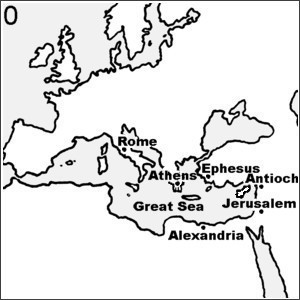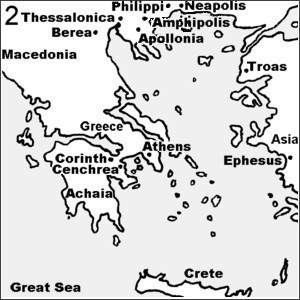
Acts 19:21-41
—Verse by verse
This page is a verse by verse study of Acts 19:21-41. These verses describe Paul’s troubles in Ephesus with the followers of the goddess Diana, also known as Artemis.
The goddess, Diana of the Ephesians
Acts 19:21-41
¶“21Now when these events were over, Paul determined in spirit to go to Jerusalem once he had passed through Macedonia and Achaia. He said, 'After I have been to Jerusalem, I must also see Rome.' 22He sent into Macedonia two of those who served him, Timothy and Erastus, yet he himself still remained awhile in Asia.” (Acts 19:21-22).
¶“23Around that time there arose an uproar concerning the Way, and it wasn't small. 24There was a man named Demetrius who was a silversmith. He made silver shrines of the goddess Artemis, bringing a lot of business to the craftsmen. 25This Demetrius got these artisans together, with the workmen of like occupation, and said, 'Gentlemen, you know that our prosperity relies on this business. 26However, you see and hear, that not at Ephesus alone, but almost throughout all Asia, this Paul has persuaded and turned away many people, saying that handcrafted gods are false gods. 27Not only is there danger that this trade of ours will come into disrepute, but also that the temple of the great goddess Artemis will be despised; and her majesty destroyed, whom all Asia and the whole world worships.' ” (Acts 19:23-27).
¶“28Those who heard this were filled with anger, and cried out, saying, 'Great is Artemis of the Ephesians!' 29Soon the whole city was filled with confusion, and they rushed with one accord into the theater. The crowd had seized Gaius and Aristarchus, men of Macedonia, who were among Paul’s travelling companions. 30When Paul wanted to enter in to the people, the disciples wouldn't allow him. 31Furthermore, some of the Asiarchs who were his friends, sent a message to him, begging him not to venture into the theater.” (Acts 19:28-31).
¶“32The assembly was in confusion. Some of the mob cried one thing, and some another. Most of them didn't know why they had come together. 33They brought Alexander out of the crowd, the Jews putting him forward. Alexander beckoned with his hand, and would have made a defense to the people. 34But when they realised that he was a Jew, they all cried out as one, 'Great is Artemis of the Ephesians!' They kept this up for about two hours” (Acts 19:32-34).
¶“35When the town clerk had quieted the multitude, he said, “You men of Ephesus, what man is there who doesn't know that the city of the Ephesians is guardian of the temple of the great goddess Artemis, and of the image which fell down from Zeus? 36Seeing then that these things cannot be denied, you ought to be quiet, and to do nothing rash. 37For you have brought these men here, who are neither robbers of temples nor blasphemers of your goddess. 38If therefore Demetrius and the craftsmen who are with him have a matter against anyone, the courts are open, and there are proconsuls. Let them press charges against one another. 39But if you seek anything beyond this, it will be settled in the regular assembly. 40For indeed we are in danger of being accused concerning this day’s riot, there being no just cause. We wouldn't be able to give an account regarding this commotion.” 41When he had said this, he dismissed the assembly.” (Acts 19:35-41).
1 Paul Looks Toward Leaving Ephesus
Verses 21-22
¶ "Now when these events were over, Paul determined in spirit to go to Jerusalem once he had passed through Macedonia and Achaia. He said, “After I have been to Jerusalem, I must also see Rome.” He sent into Macedonia two of those who served him, Timothy and Erastus, yet he himself still remained awhile in Asia." (Acts 19:21-22).


- Go to Jerusalem. Paul spent around three years in Ephesus, where "a wide door for effective service" had opened for him (1Corinthians 16:8-8). He was by this time planning to travel again, and continue his third missionary journey. This journey was to end in Jerusalem, after which he was going to be taken to Rome as described in the last two chapters of Acts. However, before going to Jerusalem, he wished to go back to Macedonia and Achaia to do more work there. He sent men ahead to start that work while he concluded his work in Asia.
- Determined in spirit. Some think that the “spirit” mentioned is the Holy Spirit as distinct from Paul’s own. Later we will see that the Holy Spirit warned Paul about going to Jerusalem, and his brethren begged him not to go (Acts 21:10-14). Whilst the Holy Spirit did not forbid Paul to go to Jerusalem, neither did he determine that Paul should go. It was Paul’s own determination to go.
- Timothy and Erastus. Paul had several comrades in his ministry and on his journeys. They were not always with him, but sometimes they would remain behind to complete Paul’s work, or go ahead to prepare for it.
2 Asian Artisans Cause Untimely Riot
Verses 23-27
¶ "Around that time there arose an uproar concerning the Way, and it wasn't small. For a certain man named Demetrius, a silversmith, who made silver shrines of Artemis, brought a lot of business to the craftsmen. He got these artisans together, with the workmen of like occupation, and said, “Gentlemen, you know that our prosperity relies on this business. However, you see and hear, that not at Ephesus alone, but almost throughout all Asia, this Paul has persuaded and turned away many people, saying that handcrafted gods are false gods. Not only is there danger that this trade of ours will come into disrepute, but also that the temple of the great goddess Artemis will be despised; and her majesty destroyed, whom all Asia and the whole world worships.”" (Acts 19:23-27).
- Artemis. This is the name of the goddess in the Greek, but in Latin (the Roman language) she is called Diana.
- Demetrius stirs up trouble. This Demetrius had not openly opposed Paul in the three years Paul spent preaching in Ephesus. Suddenly, as Paul was winding up his work in Ephesus and ready to leave, Demetrius decided to stir up the people to riot. The things of which Demetrius accused Paul were largely true, but his method of taking action against Paul was illegal.
Verses 28-31
¶ "Those who heard this were filled with anger, and cried out, saying, “Great is Artemis of the Ephesians!” Soon the whole city was filled with confusion, and they rushed with one accord into the theater. The crowd had seized Gaius and Aristarchus, men of Macedonia, who were among Paul’s travelling companions. When Paul wanted to enter in to the people, the disciples wouldn't allow him. Furthermore, some of the Asiarchs who were his friends, sent a message to him, begging him not to venture into the theater." (Acts 19:28-31).
- Asiarchs. These were important and probably wealthy citizens of Asia who were, or had been, on a board of officials appointed to oversee the management of Roman public events such as the games. They would therefore have some expertise in handling public disturbance. Paul, a Roman citizen from an important city, would have access to such society, hence some of the Asiarchs were his friends and they urged him to keep out of the affray so as not to make it worse and not to endanger himself.
Verses 32-34
¶ "The assembly was in confusion. Some of the mob cried one thing, and some another. Most of them didn't know why they had come together. They brought Alexander out of the crowd, the Jews putting him forward. Alexander beckoned with his hand, and would have made a defense to the people. But when they perceived that he was a Jew, all with one voice cried out, “Great is Artemis of the Ephesians!” They kept this up for about two hours" (Acts 19:32-34).
- Alexander the Jew. The Jews were getting involved in an effort to keep the people from turning on them too, since the Jews were against idols. They probably hoped also to help stir the people all the more against Paul. But Alexander failed to be heard.
- Two hours. It is surprising that the chanting went on so long. The authorities probably thought it wise to just monitor the situation and let it die down of its own accord to the point where order could be restored.
3 Town Clerk of Ephesus Quashes Riot
Verses 35-41
¶ "When the town clerk had quieted the multitude, he said, “You men of Ephesus, what man is there who doesn't know that the city of the Ephesians is guardian of the temple of the great goddess Artemis, and of the image which fell down from Zeus? Seeing then that these things cannot be denied, you ought to be quiet, and to do nothing rash. For you have brought these men here, who are neither robbers of temples nor blasphemers of your goddess. If therefore Demetrius and the craftsmen who are with him have a matter against anyone, the courts are open, and there are proconsuls. Let them press charges against one another. But if you seek anything beyond this, it will be settled in the regular assembly. For indeed we are in danger of being accused concerning this day’s riot, there being no just cause. We wouldn't be able to give an account regarding this commotion.” When he had thus spoken, he dismissed the assembly." (Acts 19:35-41).
- The town clerk. The town clerk made a diplomatic speech in which he first said a few crowd-pleasing things about the goddess, second asserted that the Christians had done nothing illegal, third asserted that Demetrius and the craftsmen need to follow the due process of law, and fourth warned that the Roman authorities could punish the city for the riot.
- Christianity has consequences. This account shows how the gospel can disrupt the normal customs, values, and beliefs of a society and even its economy. However if it's true Christianity, then it will do this only to the extent of changing things that are wrong —in this case turning people from vain idols to the living God. Such change will not damage the society but improve it, and leave the good aspects of the society not only undisturbed but more able to flourish.